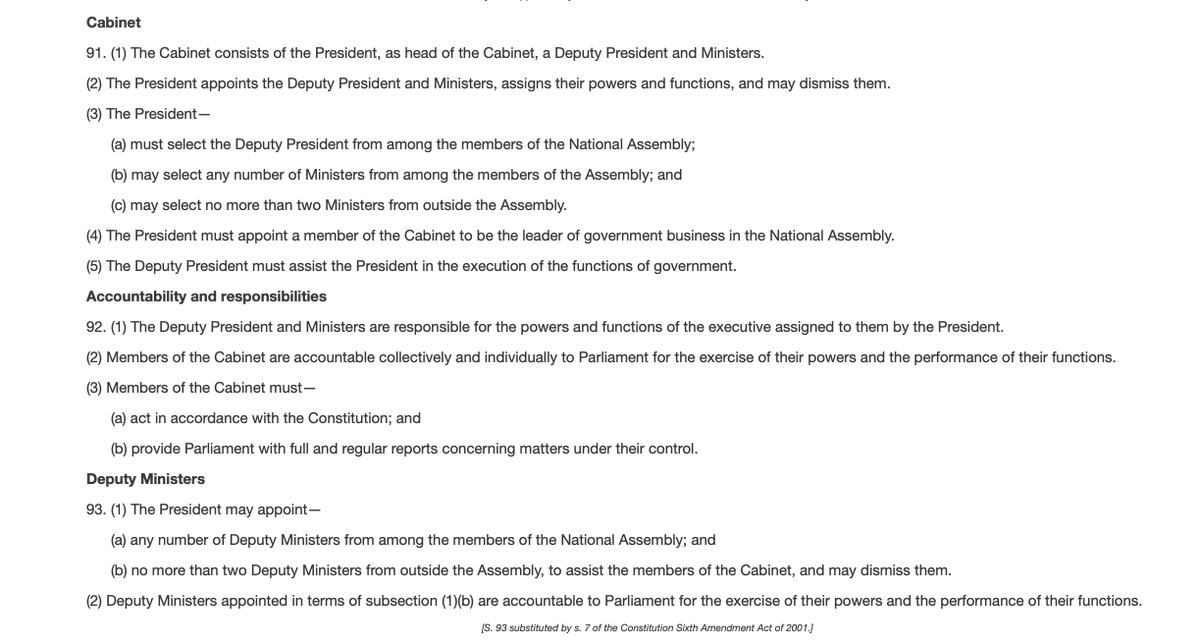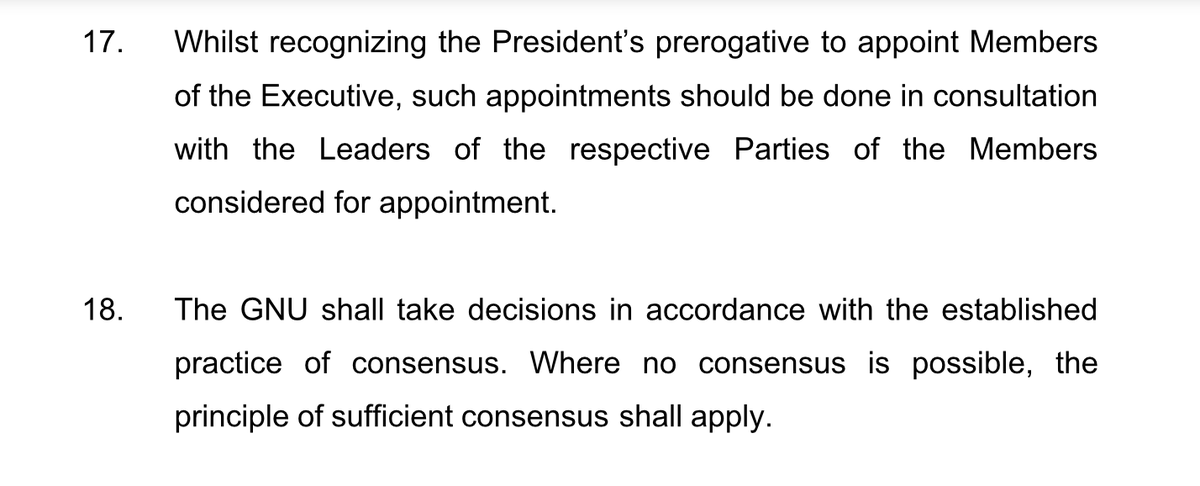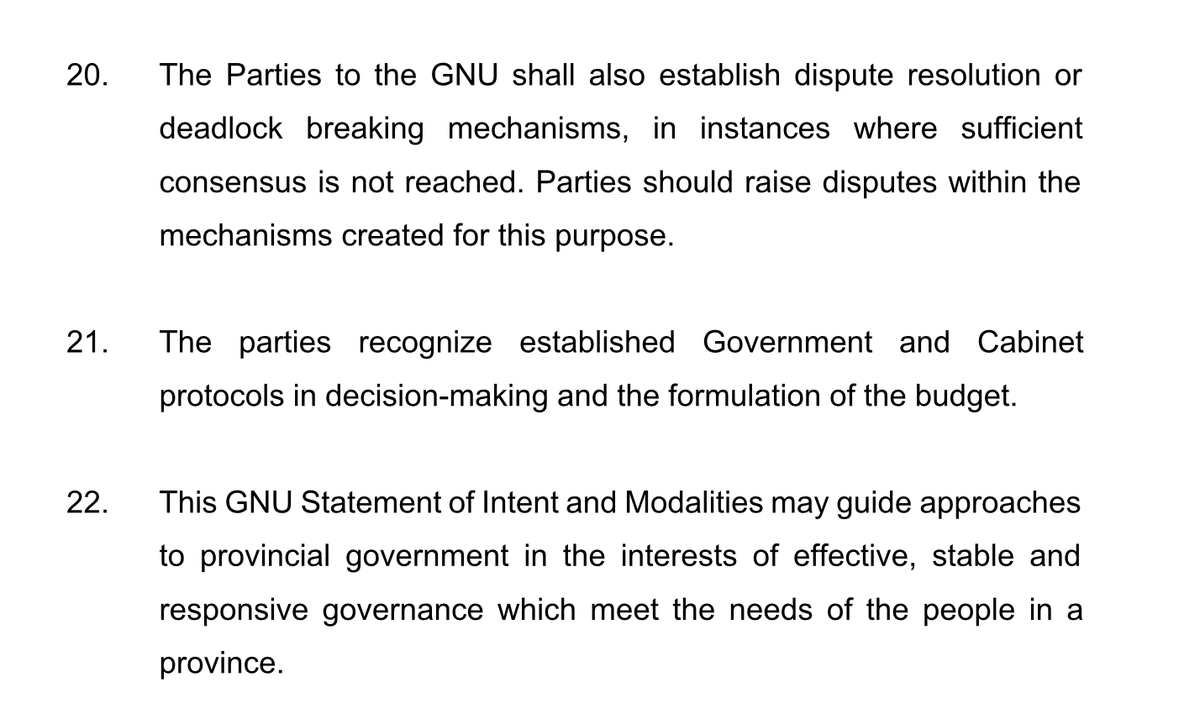The coalition agreement between the DA, ANC, and IFP may not meet constitutional muster, I argue. Regardless of whether it has been agreed upon, it is null & void. It contains provisions that skirt too close to the violation of the party/state division.
A thread. 🧵🪡
A thread. 🧵🪡
1. To start, it is an exciting time. Finally, the ANC can be held accountable. Wonderful, but does that process meet constitutional muster? Is the process legal? I am afraid that it is not, in my humble opinion.
2. The agreement reads like its sole focus is on the appointment of Ministers. Vague requirements are included of alignment with the founding values of the Constitution. That is all well and good. It also commits alignment to the Bill of Rights. Lovely.
3. It is nice that the respective parties have agreed to uphold the Constitution and a coalition agreement that enforces it. Lovely, but largely elementary and unenforceable. The duty is already enforced through the oath of office that binds MPs to uphold the Constitution.
4. What is the mechanism if the conduct of MPs does not meet constitutional muster? Parliament. What is the mechanism for oversight of the conduct of the government? Parliament. Why is this? The separation of powers.
5. While SA does not have a specific law explicitly outlining the party/state division in a single, consolidated form, the principle is embedded within the broader constitutional and legal framework of SA’s democratic governance, accountability, and the separation of powers.
6. What is the separation of powers? It refers to the division of government responsibilities into distinct branches to prevent any one branch from exercising the core functions of another. The aim is to provide a system of checks and balances, safeguarding democracy.
7. These are the three branches of the state, each with their own specific mandates: The Executive, The Legislature and the Judiciary.
8. A. The Executive:
• President, DP, Ministers, and Deputy Ministers.
• Responsible for implementing and administering laws and policies.
• Enforces laws, runs the day-to-day affairs of the country, formulates and implements national policies, and manages state resources.
• President, DP, Ministers, and Deputy Ministers.
• Responsible for implementing and administering laws and policies.
• Enforces laws, runs the day-to-day affairs of the country, formulates and implements national policies, and manages state resources.
9. B. The Legislature:
- Parliament - the National Assembly & NCOP
- Responsible for making laws and scrutinizing the work of the executive.
- Drafting, debating, and passing legislation, approving budgets, overseeing the executive branch, and representing the electorate.
- Parliament - the National Assembly & NCOP
- Responsible for making laws and scrutinizing the work of the executive.
- Drafting, debating, and passing legislation, approving budgets, overseeing the executive branch, and representing the electorate.
10. C. The Judiciary:
- The courts with the CC as apex
- Responsible for interpreting and applying the law. - Adjudicating disputes, interpreting the constitution, ensuring laws comply with constitutional principles, and protecting the rights and freedoms of individuals.
- The courts with the CC as apex
- Responsible for interpreting and applying the law. - Adjudicating disputes, interpreting the constitution, ensuring laws comply with constitutional principles, and protecting the rights and freedoms of individuals.
11. Each branch operates independently, without undue interference from the others. The 3 have mechanisms to check each other’s powers. eg. the legislature can pass a MoNC executive, and the judiciary can declare legislative or executive actions unconstitutional.
12. Great. Scene set, framework of analysis set. To start, who makes up the executive? That is, who runs South Africa on a day-to-day basis? Who delivers services, etc.? The President, Ministers, and Deputy Ministers. Nobody else.
13. What is the role of the President in this framework? What are his responsibilities and what checks and balances exist specifically related to the President? The President is the Head of State and head of the national executive. He is SA’s executive authority.






14. As you will see, the President has the sole authority in making any appointments that the Constitution or legislation requires the President to make, other than himself as Head of the Executive, elected by Parliament. Appointing the Executive is his sole prerogative.
15. Shall we delve into the President’s prerogative powers and checks and balances (C&B)? The President’s prerogatives include a range of powers and duties, some of which are exercised independently, while others require consultation or approval from other branches of government
16. Sole prerogatives:
• Appointment of Cabinet. C&B: Parliament can pass a MoNC in the President and/or Cabinet.
• Signs laws. C&B: judiciary can check for constitutionality & other legalities
• Pardons. C&B: Largely discretionary but can be subject to judicial review.
• Appointment of Cabinet. C&B: Parliament can pass a MoNC in the President and/or Cabinet.
• Signs laws. C&B: judiciary can check for constitutionality & other legalities
• Pardons. C&B: Largely discretionary but can be subject to judicial review.
17. Right. Let’s test the coalition agreement against the framework set. The agreement sets the following requirements for the appointment of the Cabinet. This is unconstitutional. Parties do not have a say in the exercise of this power.




18. Before anyone says the prerogative stands. No.
"Whilst recognizing the President’s prerogative to appoint Members of the Executive, such appointments should be done in consultation with the Leaders of the respective Parties of the Members considered for appointment."
"Whilst recognizing the President’s prerogative to appoint Members of the Executive, such appointments should be done in consultation with the Leaders of the respective Parties of the Members considered for appointment."
19. The agreement establishes a GNU Consultations Council responsible for consultations and monitoring the progress of the government, its resourcing, and implementation mechanisms. This is unconstitutional. Again, checks and balances are vested in Parliament, not a quasi-body.
20. What risks exist with forming an external body to exercise oversight over the government? 1. It’s unconstitutional. Secondly, the reason why Parliament is open, with public participation, is to ensure that the work of oversight is public & not behind closed doors
21. Thirdly, the government must remain independent from political parties. Involving parties in the operations of the government violates the essential principle of party and state division and the separation of powers.
22. The separation of powers specifically mandates that the functions of governance are carried out independently, without interference from party structures. This ensures impartiality, accountability, and the integrity of democratic processes. Party apparatchiks have no role.
23. Allowing political parties to directly influence governing decisions undermines the very foundation of democratic governance. eg involving an SG of a party, who is not an MP in executive decisions compromises the accountability mechanisms that are integral to our democracy.
24. Elected officials operate within the constitutional framework designed to maintain checks & balances. Party officials, on the other hand, are not directly accountable to the public and their involvement in government decisions blurs the lines of responsibility and oversight
25. This dilution of accountability risks fostering corruption & eroding public trust in government institutions. To safeguard democracy, it is crucial that governing decisions remain within the purview of elected representatives and constitutionally designated bodies.
26. I am very sorry. The law is stubborn and, might I add, boring. At this crucial time, with power so close they can lick it, parties are playing fast & loose with constitutionalism & the rule of law. It must stand.
27. I am sure many will disagree with my assessment. Please do so. This is merely my opinion. And perhaps, what needs to happen is for the agreement to be subjected to judicial review. Either way, it is up to us as the public to monitor the conduct of parties. The job is ours.
For you @clivesimpkins. You have encouraged me to share these. Thank you for doing that. I hope this one is similar food thought.
• • •
Missing some Tweet in this thread? You can try to
force a refresh








